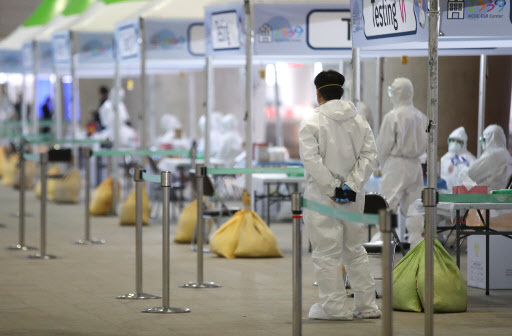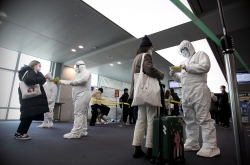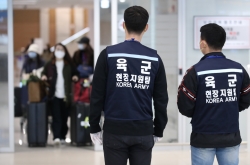South Korea began to operate “walk-through” testing facilities for the novel coronavirus at Incheon International Airport on Thursday to speed up screening amid an alarming rise in the number of cases imported from Europe and the US.
Korea reported 104 new cases Thursday, bringing total infections to 9,241, according to the Korea Centers for Disease Control and Prevention.
Of the new cases, 39 cases -- 34 citizens and five foreign nationals -- involved travelers arriving in Korea from abroad. Of these imported cases, 25 were from Europe, 11 from America and three from Asia. Some 30 were detected during airport quarantine screening.
Up to 2,000 people can be tested for COVID-19 daily at 16 open-air testing booths installed in five locations at the airport’s two terminals. Roughly, that means testing one person every five minutes.
As the facilities are set up in the open air, virus-carrying particles such as droplets of saliva are blown away by the wind, which makes the testing process safer and quicker, according to Yoon Tae-ho, a senior official from the Ministry of Health and Welfare.
About 12 people can be tested for the virus per hour, while about eight people can be tested per hour at drive-thru facilities and about three at walk-in facilities. Some 41 medical professionals and 35 military personnel will be dispatched to the facilities, he said.
Mostly, foreigners flying from Europe and short-term foreign tourists who show no symptoms will be tested at the walk-through facilities.
Those with symptoms -- regardless of nationality -- are currently separated and tested for the virus at quarantine facilities set up inside the airport.
Among incoming travelers from Europe without symptoms, Korean citizens and foreign nationals with long-term visas are required to get tested within three days upon arrival and self-quarantine for 14 days. Asymptomatic travelers from the US don’t have to be tested, but are required to self-quarantine for the two-week period.
The walk-through facilities came as the country toughened quarantine measures for inbound travelers amid a growing number of cases imported from abroad in recent weeks. This week alone, 86 cases came from Europe, 45 from the Americas and eight from Asia. Of all cases in the country, 284 infected people -- 31 of whom were foreigners -- came from abroad.
The government also reiterated its “zero tolerance” policy for those who violate self-isolation rules.
“(The government) should apply the no-tolerance principle to those who violate self-isolation rules without proper reasons,” Prime Minister Chung Sye-kyun said at a pangovernmental meeting on coronavirus responses Thursday.
“There is a need to file complaints with those who do not abide by the rules without legitimate reasons and to order deportation in the case of foreigners,” he said.
Korean citizens violating self-quarantine rules -- leaving their homes without permission, for example -- face fines of up to 10 million won ($8,120) and imprisonment for up to one year. They will be denied the living allowances -- about 1.2 million won for a four-member household -- given to those under self-isolation.
Foreigners will be deported if they breach the rules.
Adherence is monitored with a mobile application. No one can enter Korea without downloading the app.
The measures came amid a series of reports on violations of self-quarantine guidelines. While 60.9 percent of those under self-quarantine downloaded the app, 11 people were found to have left their homes without approval, according to the government data.
Meanwhile, the Seoul City government on Thursday canceled a permit for a foundation linked to the Shincheonji Church of Jesus, accusing it of impeding the government’s quarantine efforts by withholding information from the health authorities and harming public good.
The fringe religious sect is linked to 55 percent of the country’s total cases.
Of the new cases reported Thursday, 26 cases were confirmed in Daegu, the city at the center of the coronavirus outbreak here, 14 in Gyeonggi Province, 13 in Seoul and 12 in North Gyeongsang Province. The cases in Daegu and North Gyeongsang Province represent 70.14 percent and 13.79 percent, respectively, of the country’s total.
Some 82.2 percent of the country’s total cases were linked to clusters of infections.
The total death toll rose by five to 131, with the overall fatality rate so far standing at 1.42 percent, according to the KCDC. The death rate is 6.66 percent for those in their 70s and 13.94 percent for those in their 80s.
A total of 82 people were in serious or critical condition, according to the KCDC.
So far, 4,144 COVID-19 patients or 44.8 percent, in Korea made full recoveries since the country reported the first case on Jan. 20, with 414 more people having been discharged from isolation Thursday.
A total of 364,942 people have been tested for the virus, with 341,332 testing negative. Some 14,369 are still awaiting test results.
By Ock Hyun-ju (
laeticia.ock@heraldcorp.com)












![[Today’s K-pop] Blackpink’s Jennie, Lisa invited to Coachella as solo acts](http://res.heraldm.com/phpwas/restmb_idxmake.php?idx=644&simg=/content/image/2024/11/21/20241121050099_0.jpg)